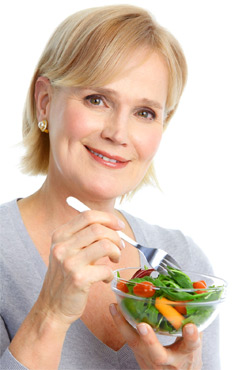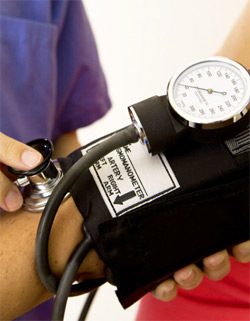|
|
|
 , ,
Font size |
Health Tips for the Aged
 In old age, the
metabolism of your body is disturbed,
immunity decrease and
disease seem to attack simultaneously. A person is considered old at 60 or above
when his/her activity becomes slow and the way of life becomes sedentary. In
this article there is a discussion about the general problems of this age and
some useful hints to overcome such problems. In old age, the
metabolism of your body is disturbed,
immunity decrease and
disease seem to attack simultaneously. A person is considered old at 60 or above
when his/her activity becomes slow and the way of life becomes sedentary. In
this article there is a discussion about the general problems of this age and
some useful hints to overcome such problems.
If you are over 50, you might need
certain supplements.
|
-
Vitamin B12-2.4 mcg (micrograms) of B12 each day.
-
Calcium-1200 mg (milligrams), but not more than 2500 mg a
day.
-
Vitamin D-400 IU (international units) for people age 51 to
70 and 600 IU for those over 70, but not more than 2000 IU each
day.
-
Iron-extra iron for women past menopause who are using
hormone replacement therapy (men and other postmenopausal women
need 8 mg of iron).
-
Vitamin B6-1.5 mg for women. This vitamin is needed for
forming red blood cells and to keep you healthy.
|
Since the energy requirements are low in old age reduction in calories is
recommended. The quantity of food taken at a time should be decreased because
the capacity to digest and tolerate meals decrease. This is because the senses
of smell and taste are less active and there is less secretion of gastric
juices.
 Though the total food intake is lowered the requirements of most nutrients
remain unaltered. Therefore it becomes important to provide adequate amounts of
all the nutrients within the decreased energy levels. Hence
carbohydrates,
fats,
protein and
vitamins are accordingly increased or decreased to provide the
required energy and food. Though the total food intake is lowered the requirements of most nutrients
remain unaltered. Therefore it becomes important to provide adequate amounts of
all the nutrients within the decreased energy levels. Hence
carbohydrates,
fats,
protein and
vitamins are accordingly increased or decreased to provide the
required energy and food.
-
Fat intake should be decreased and taken according to energy
requirements for specific body weight.
-
Protein should neither be decreased nor increased. They should be taken
as before. i.e, one gram per kilo body weight.
-
Iron is also recommend in similar doses as before i.e, micrograms per
kilo body weight or about 28-30 mg of iron per day. Women after menopause do
not lose blood so only the normal loss needs to be compensated.
-
Extra calcium is very necessary especially for post - menopausal women.
Due to hormonal changes there is continuous loss of bone calcium and bone
de-mineralization is much faster than the bone mineralisation process. Hence
bones are more prone to fractures. Hipbone fracture is very common in
elderly females who may slip while bathing.
-
Most vitamin requirements are not affected by ageing, except incase of
Thiamin, Riboflavin and Niacin. As per the decrease in energy requirements
there is a decrease in the required amounts of intake.
-
Vitamin D is normally not required in extra doses but for bedridden
elders it is very essential to get sunshine especially after a little
massage which helps in absorption of vitamin D.
-
Rich fried foods, cereals, starches, sweets chocolates creams and butter
should be avoided. Instead fruit vegetables, milk and milk products (not
concentrated) should be preferred.
-
Constipation is a common problems among the elderly due to reduced
muscle tone of the gastrointestinal tract. Soft low-fibre diet and
insufficient fluid intake also influence this.
Dietary fibre is beneficial
in various conditions associated with ageing such as constipation,
diabetes
and heart disease.
-
Inability to chew due to ill-fitted dentures or absence of teeth is one
of the major problems. The diet should be soft and spongy so that it does
not hurt the gums. Fluid diet like milk products, custard, kheer, boiled
eggs, vegetables (well cooked and steamed), grated salad, soft fruit like
banana, chikoo and oranges should be preferred.
-
As the appetite usually declines the food should be colorful, attractive
and tasty and served in a pleasant way to arouse the appetite.
-
Even though, salad and vegetables have to be grated they should be
included for their fibre.
-
 Raised blood pressure is a very common problems due to diminished renal
function. This leads to a restricted fat and salts intake. Raised blood pressure is a very common problems due to diminished renal
function. This leads to a restricted fat and salts intake.
-
Diabetes occurs to the impaired ability of the elderly, to utilize
carbohydrates because of the decreased sensitivity of cells to insulin. Low
carbohydrates, especially glucose, is recommend.
-
Women suffer from post - menopausal symptoms after cessation of
menstruation due to hormonal changes. Some of the symptoms are loss of skin
elasticity, smaller breast size, weight changes, insomnia, hot flushes, high
blood pressure, vaginal dryness, alternations in sexual desire, painful
intercourse resulting in stress, anger etc.
-
Another major risk is
osteoporosis which is due to oestrogen deficiency
that occurs with menopause. Women who take oestrogen hormone after menopause
maintain bone density. But once a woman is on hormones, withdrawal is more
harmful because bone density is then lost rapidly and chances of hip and
wrist fracture increase. Combinations of oestrogen and progesterone help
protect the bone and reduce risk of fracture. Women having
breast cancer,
vaginal bleeding with unknown cause, uterine cancer, liver disease and gall
- stones should not take hormones. A physical examination including a normal
pelvic examination pap's smear and mammography, is necessary before putting
a patient on hormone therapy. Effects of hormone replacement such as,
nausea, headaches, bloating and breast enlargement may cause enough
irritation for a woman to stop her hormone. Altering the dose to type of
hormones can decrease these symptoms. Women mostly prefer not to take
hormones. In such cases symptomatic treatments has to be done. For examples
in case of hot flushes and high blood pressure medications of high blood
pressure helps.
-
Risk of fracture due to reduction in bone density can be offset by high
calcium diet supplements with vitamin D.
-
Smoking causes extra wrinkles. Once this is stopped loss of skin
elasticity is reduced.
-
-
New studies, have revealed that if a woman, 70 years of age follows a
daily exercise programme for one year she can get back the strength and
flexibility of a woman 40 years of age. Exercise only for two minutes
initially and gradually increase the duration. In between relax for a few
minutes. You can perform Shavasan after exercising.
Warm- up is a must
before starting the exercise. You may do this by
walking for 5-6 minutes.
Dated 05 March 2015
Related Links
|
|
|
|









